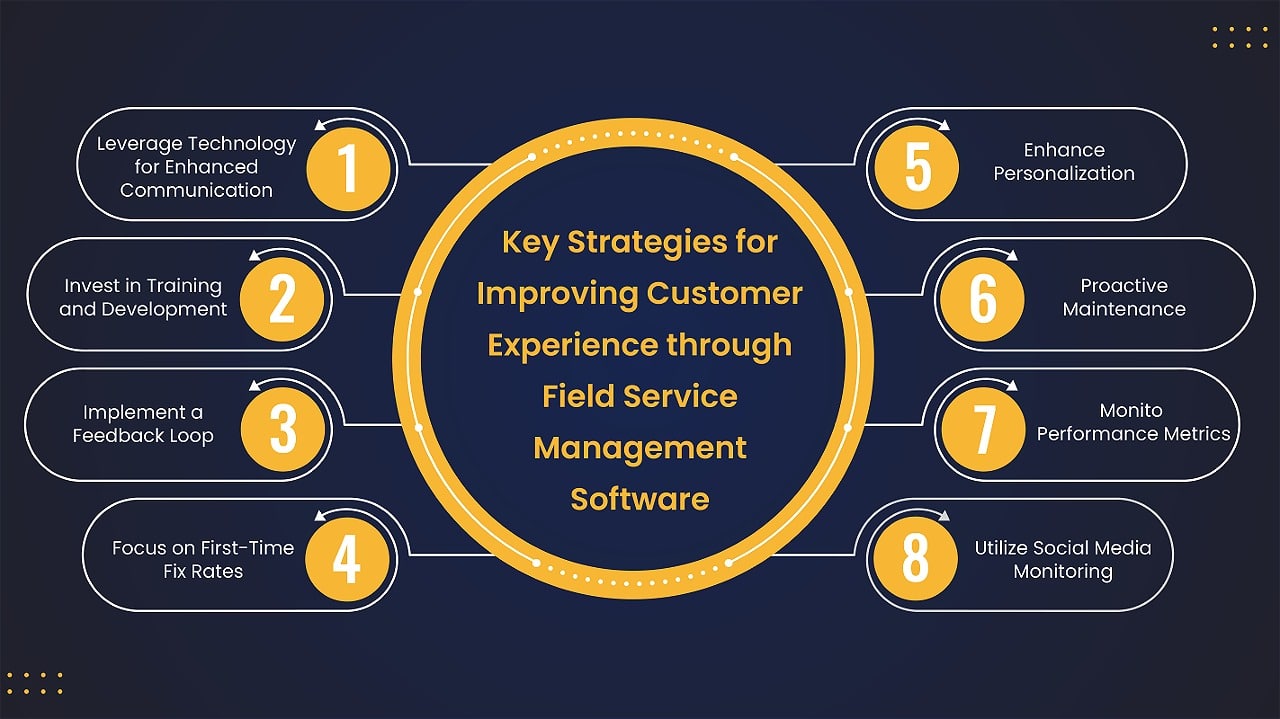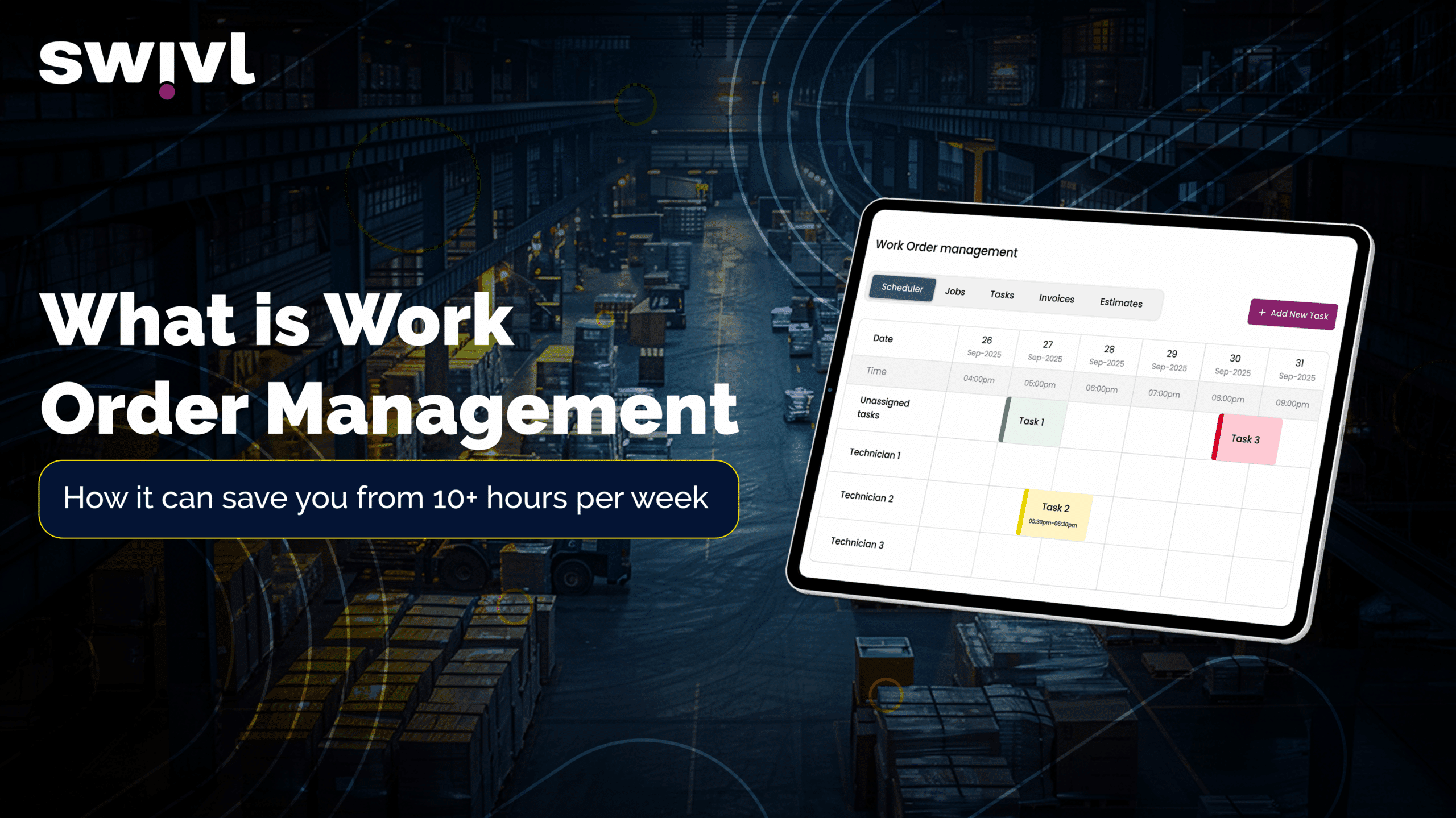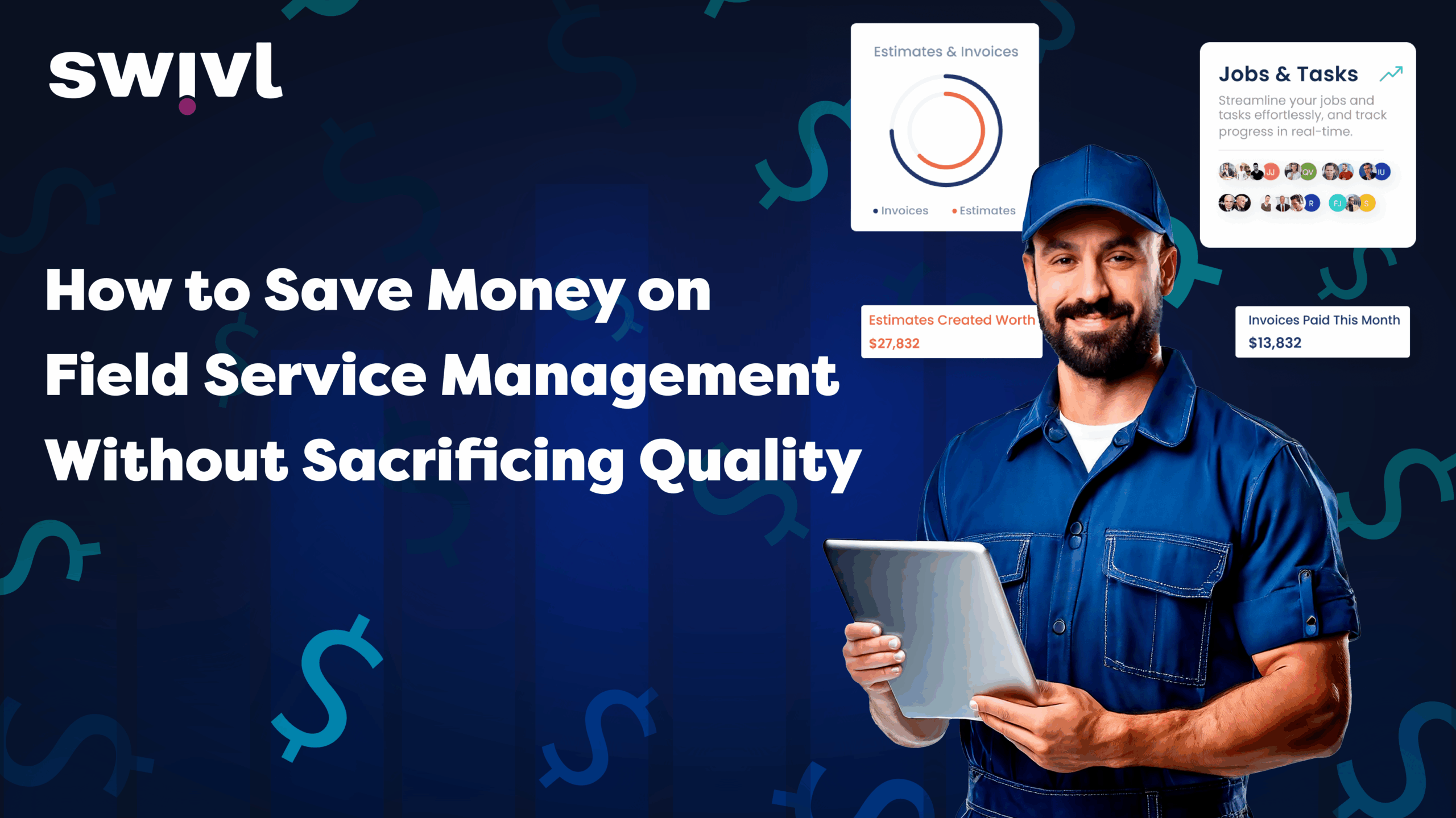Did you know that 73% of customers say a positive experience is key to influencing their brand loyalty? This is because modern customers expect more than just satisfying their basic requirements.
So, now the question might be: What do they expect? How exactly can we achieve them?
The answer is turning your business more customer-centric and putting your customers first.
Yes! Businesses are increasingly prioritizing customer satisfaction over (services and personalizing experiences.)
Technology, such as Customer Relationship Management systems, Artificial Intelligence, and data analytics, empowers businesses to understand customer preferences better, streamline operations, and provide timely responses. This technological shift makes customer-centricity achievable and sustainable, elevating customer satisfaction and loyalty.
Using the appropriate tool and adapting to the latest technologies.
Field Service Management (FSM). This transformative tool has the power to revolutionize your customer service scenario. FSM enables businesses to reconstruct their customer experience model by unifying operational management with transparent, immediate service, offering a new horizon of possibilities. Indeed,Field service management provides instant response capabilities and proactive servicing, complemented by real-time feedback tools that empower businesses to achieve exceptional customer satisfaction. Satisfied customers are more likely to remain loyal to a company.
Implementing FSM to enhance customer satisfaction enables businesses to improve client retention while fostering lasting loyalty that drives repeat business.
Are you curious to know more about the FSM and how it enhances both customer satisfaction and loyalty?
Then you are at the right place; this blog is for you. Let’s dive into this blog.
The Shift to Customer-Centric Business Models
According to PwC, 32% of customers will stop supporting a brand they love after just one bad experience. On the other hand, companies that provide excellent customer experiences can grow their revenue 4-8% above the market average.
This is because the business benefits immensely from customers who spread positive word-of-mouth and cut down marketing expenditures. And for Field service companies, this is a crucial aspect as one appointment delay or unattended matter can destroy existing customer relationships permanently.
So that’s why purchasing appropriate tools alongside appropriate tech enables both operational excellence and extraordinary customer satisfaction. Businesses enhance customer loyalty by focusing on satisfaction which produces better retention along with additional brand advocacy. The sustainable growth and competitive advantage of a business depend fundamentally on satisfied customers who effectively drive new business acquisition.
The Role of Technology in Driving Customer-Centricity
Companies use technology to build customer-centric practices as their foundation by enhancing organizational systems while providing personalized interactions. The Field Service Management (FSM) software provides businesses with a powerful combination of operational efficiency and outstanding customer service capabilities.
Not only this, FSM helps organizations by providing customer service and solving problems and collecting instant feedback from the field
.
Now imagine a technician who arrives on time to address issues quickly while personally communicating with customers can be made possible through FSM technology. FSM enables proactive service delivery which produces delighted customers and strengthens their commitment towards the company.
Moreover, the use of FSM enables businesses to assign appropriate resources and tools to technicians for every scheduled job. The improvement of communication and shortened delays enables businesses to offer smooth experiences that retain customer loyalty.
The Difference between Field Service Management (FSM) and Workforce Management (WFM)
Field Service Management (FSM) and Workforce management are two important needs for an efficient operational strategy that helps businesses optimize their resources, improve efficiency, and enhance service delivery. While they both share similarities, their applications, and functionalities differ. Below are the differences between the FSM and WFM:
Why Customer Loyalty Matters in Field Service?
As a field service business owner, you might have seen firsthand how customer loyalty can make or break a company. Loyal customers are more than just repeat buyers—they’re your biggest advocates. They refer your services to friends and family, leave positive reviews, and stick with you even when competitors try to lure them away. In fact, increasing customer retention rates by just 5% can boost profits by 25% to 95%, according to Bain & Company.
How FSM Enhances Customer Satisfaction and Loyalty
Field Service Management software is designed to optimize operations while putting customers at the heart of your business. Here’s how it works:
- Timely Responses: FSM enables real-time scheduling and dispatching, ensuring that technicians arrive on time and are fully prepared to address customer needs. This reduces wait times and enhances the overall experience.
- Personalized Services: With access to customer history and preferences, technicians can tailor their approach, making customers feel valued and understood.
- Efficient Problem Resolution: FSM provides technicians with the tools and information they need to resolve issues quickly and effectively, minimizing repeat visits and frustration.
- Proactive Communication: Real-time updates and notifications keep customers informed every step of the way, building trust and transparency.
By integrating FSM into your operations, you not only improve customer satisfaction but also drive profitability. Streamlined processes reduce operational costs, while happy customers generate repeat business and referrals. It’s a virtuous cycle that benefits both your business and your clients.
The Mutual Benefits of FSM
The beauty of FSM lies in its ability to create mutual value. For customers, it means faster, more reliable, and personalized service. For businesses, it means higher retention rates, increased revenue, and a stronger competitive edge. Companies that prioritize this balance are better positioned to thrive in today’s market, where customer expectations are higher than ever. That includes:
- Faster Service: Providing FSM software enables quicker dispatching operations along with scheduling improvements that yield faster responses to customer needs thus leading to enhanced customer satisfaction.
- Reliable Operations: The optimal allocation of resources through FSM makes sure technicians reach their assignments with required tools and relevant information thus preventing delays in service.
- Personalized Experiences: Technical service becomes more effective through real-time data access because it enables technicians to use customer-specific historical information for improved interaction.
- Higher Retention Rates: FSM enhances customer retention since satisfied clients choose to stay with organizations that employ FSM effectively.
- Increased Revenue: Companies that enhance operational efficiency together with better customer satisfaction will receive repeat business from satisfied customers who refer others to the company which results in higher total revenue.
- Competitive Advantage: Through FSM technology companies secure market separation because they fulfill customer expectations without limits.
A Symbiotic Relationship Between Field Service Management and Client Satisfaction
You know it is important to maintain a symbiotic relationship between field service management and client. And the reason is satisfied loyal customers transform field service management into a more straightforward process. Below are strategic approaches to improve FSM customer service.
- Enhanced First-Time Fix RatesA field service operation that succeeds in its operations must maintain consistently high first-time fix rates because it creates satisfied customers. Field Service Management delivers important technical information at the same time as providing necessary tools to technical staff. Proper technician preparation results in high increases of customer satisfaction during first service appointments since experts deliver solutions that maintain stability and decrease client dissatisfaction and service delays.
- A Proactive Service ApproachFSM organizations use preventive methods which enhance the quality of their service delivery. FSM software and supplementary tools enable predictive maintenance through FSM software which allows the prediction of equipment failure occurrences before significant system failures emerge.
- Leveraging Technological InnovationsField service achieves significant benefits through AI integration and Internet of Things applications along with augmented reality technological implementations. Recent technological developments provide technical staff with additional breakdown specific information that aids their diagnostic procedures. Modern technology solutions lead to systematic enhancements of operational effectiveness in service delivery. Better customer satisfaction will naturally arise from new technological innovations that enhance field service operational efficiency and effectiveness.
- Feedback Mechanisms and Continuous ImprovementThe process of continuous improvement depends on repeated customer feedback. The mechanisms assist quality improvements through service transformation activities that match customer needs and preferences. Organizations can detect their problem zones through accessible customer feedback systems to achieve necessary modifications that lead to higher customer satisfaction rates.
- Employee Training and EmpowermentField service team members must receive appropriate equipment together with necessary knowledge to succeed at their tasks. Workers with valued expertise create better interactions between customers and employees that result in greater customer satisfaction metrics. Technical staff members spend considerable time in their branded company vehicles while delivering service to clients thus boosting client recognition and satisfaction.
Organizations gain high customer satisfaction alongside increased customer loyalty when they successfully integrate FSM systems. This leads to better overall customer experience.
Key Strategies for Improving Customer Experience through Field Service Management Software
Field Service Management (FSM) is a critical business tool that helps organizations deliver superior customer experiences. The implementation of field service management enables more efficient operations and delivers optimized service delivery, which creates crucial impacts on customer brand perception.
Here are key strategies to improve customer experience through FSM:
- Leverage Technology for Enhanced Communication
When combined with automatic messaging systems, mobile applications enable seamless communication between consumers and field service teams. Service requests receive immediate updates, which transmit confirmed appointments and technical staff to get notifications from customers in real time. By maintaining complete transparency throughout the process, customers feel less anxious and develop trust because they remain informed. - Invest in Training and DevelopmentField service technicians receive detailed training, preparing them to provide excellent customer service. Professional growth programs provide dual advantages by strengthening technical competence and teaching technicians to build better customer connections through human interaction skills. The success ratio between effective problem resolution and efficient work depends heavily on an experienced workforce.
- Implement a Feedback LoopContinuous improvement requires active mechanisms to collect customer feedback from their service experience. Surveys, along with following up on client calls and social media monitoring, shed light on user needs so businesses can find opportunities for enhancement. By responding to customer feedback, organizations signal their dedication to customer happiness while ensuring that service quality matches customer demands.
- Focus on First-Time Fix RatesSetting first-time fix goals decreases the necessity of product returns and reduces customer frustration and operational expenditure. This helps technicians resolve problems quickly during their first visit as they receive the necessary resources, including tools, parts, and relevant information.
- Enhance PersonalizationWhen it comes to the enhancement of personalization, customer satisfaction plays a key role. Customer satisfaction improves dramatically when companies customize their service experiences according to specific customer requirements. Staff members gain access to comprehensive customer profiles using CRM (Customer Relationship Management) tools that reveal both their maintenance background and personal preferences, allowing them to create individualized service contacts that build lasting customer connections.
- Proactive Maintenance
Data analytics-driven proactive maintenance methods help businesses stop equipment failure before it happens. False issues captured in advance allow companies to reduce operational stoppages, which results in happier and more loyal customers. - Monitor Performance MetricsKPIs that measure customer satisfaction need routine tracking to help businesses understand their successful and unsuccessful aspects. Customer Satisfaction (CSAT) scores and Net Promoter Scores (NPS) with first-time fix rates function as universally recognized performance benchmarks for FSM strategy assessment.
- Utilize Social Media MonitoringCustomers deliver important feedback, which researchers can access through various digital sources to understand their feelings. Businesses use social listening tools to follow brand communication while reacting quickly to consumer feedback, thus showing their dedication to quality customer service.
FSM plays a key role, and it becomes important, especially when one has to satisfy customer needs. It ensures efficient service delivery, timely responses and effective communication. By streamlining operations and providing real-time updates, FSM enhances customer satisfaction, retention and loyalty. Moreover, it makes it indispensable for businesses aiming to deliver exceptional service.
Swivl Tech: Your Partner in Improving Customer Experience
Swivl Tech, your strategic partner by improving client satisfaction together with sophisticated Field Service Management (FSM). Streamlining under Swivl’s approach results in swift, efficient service performance, boosting customer satisfaction and long-term loyalty. Enabled real-time customer communication and updates to maintain transparency, enhancing loyalty and personalized service delivery to create better connections among customers. Businesses using Swivl show fast service response times that help achieve higher first-time fixes and minimize system downtime. Customers will develop enduring loyalty when they utilize Swivl’s FSM solutions to transform their service centre interactions.





